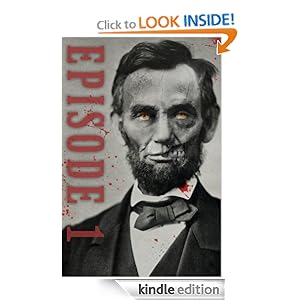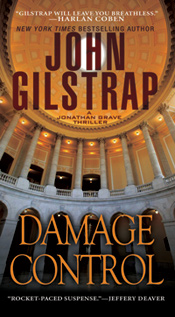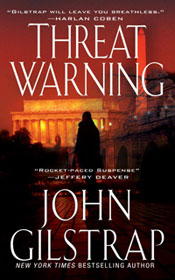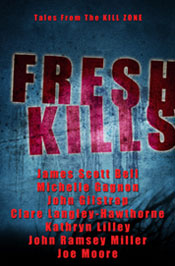What is/was the most important step in getting yourself
established in the industry?
I’d love to have a clever answer to this, but in truth, I think
the way to get established is just like the way to get published: write great stuff and submit it. We are as good as our last novel or story,
and a nice little stack of high-quality material is the way to earn a
reputation.
I think libraries all hold a near-and-dear place in our hearts, what is your take on the situation of libraries and how can we help stop the downward spiral?
I think libraries all hold a near-and-dear place in our hearts, what is your take on the situation of libraries and how can we help stop the downward spiral?
 This is of great concern to me.
My own public library, here in Redmond, WA, is one of the most-used
libraries in the country! It’s
constantly full of ESL folks, students, people in need of an internet
connection, and all sort of other people.
I wish we could, as a nation, spend more on libraries and less on
bombs. The only way I know how to effect
that is to try to vote for the best people—and of course, if the library asks
for anything, I give it.
This is of great concern to me.
My own public library, here in Redmond, WA, is one of the most-used
libraries in the country! It’s
constantly full of ESL folks, students, people in need of an internet
connection, and all sort of other people.
I wish we could, as a nation, spend more on libraries and less on
bombs. The only way I know how to effect
that is to try to vote for the best people—and of course, if the library asks
for anything, I give it.If there is only one book people can read of yours, what should it be?
Of course I love readers who tell me they’ve read everything I’ve
published! But if I had to choose just
one, it would probably be The Terrorists of Irustan, because in that particular
novel, the plot worked out in that inevitable fashion that is always my
preference. It’s hard to pull off, but
out of my seventeen novels—so far--I think that one came the closest.
What is the biggest pitfall in the publishing industry that people should stay away from?
What is the biggest pitfall in the publishing industry that people should stay away from?
Thinking that self-promotion on the internet can replace solid
writing efforts!
Getting international book deals is
another cog in the wheel of success, how should authors go about doing this?
I’m not sure how much authors can affect their international
sales. I do hear stories, occasionally,
about how someone persuaded a foreign publisher to pick up one of their books,
but I’ve had to rely on my agent.
Perhaps I’m not the best authority in this area—I’ve only had books
published in French and German and Czech, which leaves a lot of countries who
don’t yet know my name!
With more authors relying strictly on e-book sales for their success, what is the one thing that is being overlooked in the e-book industry that people should be focusing on?
With more authors relying strictly on e-book sales for their success, what is the one thing that is being overlooked in the e-book industry that people should be focusing on?
I’m still of the opinion that authors who are making a big success
by going strictly with e-books, especially self-published ones, are a tiny
percentage of the writing population in general. I love e-books. They’ve made my most recent novels sell through
a hell of a lot faster than just paper editions would. I would still, however, hate to have to rely
just on e-editions. We who are
colleagues more or less live on the internet and communicate electronically,
but there are still many, many folks who want to hold a paper book in their
hands.
Kindle Select - good or bad?
Kindle Select - good or bad?
No idea, sorry. I only
barely know what it is.
With the declining sales of print books, what do you feel needs to be done to resurrect this portion of the industry? At this point, can it come back?
With the declining sales of print books, what do you feel needs to be done to resurrect this portion of the industry? At this point, can it come back?
I think the proportional sales of e-books is just going to
rise. It’s inevitable. In every way, an e-book is more cost
effective—production, distribution, shipping (none), sales. The day will come when my answer to your
Question #6 will be outdated.
When editing, how do you separate yourself from the book to make it better when your editor gives you constructive criticism you may not agree with?
 It’s important to stick to your original inspiration as closely as
you can. You’re the author. The editor is trying to help you make it a
better book, but it wasn’t her idea (usually) in the first place. If you don’t have a clear vision of what it
should be, who will?
It’s important to stick to your original inspiration as closely as
you can. You’re the author. The editor is trying to help you make it a
better book, but it wasn’t her idea (usually) in the first place. If you don’t have a clear vision of what it
should be, who will?What has been the best way to promote your work (knowing that success is different for each individual)?
I think I’m not great at this.
I love one-on-one contact with readers, book events, conventions, that
sort of thing. The sort of mass
promotion done over the internet has so far eluded me, although Facebook and
GoodReads have been extremely helpful.
The answer to the promotion question for me is an “all of the above”
response—if I can think of it, I do it.
I send review copies, I send press releases (mostly ineffective, in my
experience), I do Facebook and GoodReads ads, I keep an up-to-date website, I
blog a bit at http://redroom.com/member/louise-marley/blog. I do bookmarks. I pray.
And I hope. That’s about it! =)
With so many self-publishing options out there now, apart from making more money (as stated time and time again by Joe Konrath) what is the biggest pro and biggest con of going about it yourself?
With so many self-publishing options out there now, apart from making more money (as stated time and time again by Joe Konrath) what is the biggest pro and biggest con of going about it yourself?
Biggest pro: cover art
control. Much bigger con: distribution, distribution, distribution.
What would you suggest bookstores do to stay with the changing industry? Would your answer be different for chains vs. local?
What would you suggest bookstores do to stay with the changing industry? Would your answer be different for chains vs. local?
I have rather strong opinions about this, especially since seeing
(as I predicted--http://redroom.com/member/louise-marley/blog/how-we-buy-books-or-a-farewell-to-borders)
the demise of Borders. One of the things
Borders did wrong was ignore local interest in assigning books to their
bookstores. They didn’t seem to care
that in Seattle, we read a lot of sf, while in Florida, they buy a lot of
romance. My first hardcover sold out the
measly three copies they had ordered in two weeks—and my local Borders wouldn’t
reorder. How do either of us stay in
business with a model like that?
Barnes & Noble does a much better job, and
their CRMs (Community Relations Managers) are wonderfully responsive to local
authors. For independent bookstores, it
all comes down to letting their customers know they’re really, really
interested in what they want to see in the store, and then following
through. And it behooves us, as writers,
to promote our local indies in whatever way we can.
What sets you apart in a sea of competition?
Quality writing. Good
storytelling. Strong
characterizations. In other words, the
usual.
What is the best piece of advice you were ever given?
What is the best piece of advice you were ever given?
Practice. (Learned it in my
musical life.)
What is your most humbling moment in the industry?
What is your most humbling moment in the industry?
Oh, God. The Death Spiral,
when my first hardcover came out just after 9/11, and the story began with a
terrorist incident. It took years to
climb out of that.
What aspirations do you have left that you've not yet met?
What aspirations do you have left that you've not yet met?
NYT Bestseller List. Don’t
we all? =)
What is the best way to handle a negative review?
Do your best to forget it.
Do you ever thank a positive reviewer? How do you go about it to not seem like you paid them for the good review?
Do you ever thank a positive reviewer? How do you go about it to not seem like you paid them for the good review?
 Really, I follow the rule: Never, ever respond to the press.
Good or bad, a review is out there, and all publicity is good
publicity. If a good friend has written
a nice review, of course I’ll thank her, but even if it’s not so good, I’ll
still thank her for taking the time to read my work and write about it. I may occasionally, however, ask someone to
help with a good Amazon review to counter a bad one, since the most recent one
is always at the top, and that can hurt.
Really, I follow the rule: Never, ever respond to the press.
Good or bad, a review is out there, and all publicity is good
publicity. If a good friend has written
a nice review, of course I’ll thank her, but even if it’s not so good, I’ll
still thank her for taking the time to read my work and write about it. I may occasionally, however, ask someone to
help with a good Amazon review to counter a bad one, since the most recent one
is always at the top, and that can hurt.
I was a classical singer for a very long
time. Mostly, I was blessed with good
reviews, quickly read and just as quickly forgotten. However, I can tell you that every bad one
was instantly committed to long-term memory, whether I wanted to have it there
or not. We’re human, and as artists,
we’re particularly vulnerable. We can
only suck it up and go on.
What fact is stranger than fiction in the publishing world?
That writers have no control over their covers! My readers have difficulty believing this,
but if you’re with a big publisher—we’re now calling them legacy publishers,
although I don’t know why—it’s the truth.
I’ve had two novels destroyed by bad covers. The publishers don’t want to believe it, but
I’m convinced it’s true. My small press
editions are my favorites, because my editor and I work together on the
covers. And they matter, they really do.
Thank you to Louise for taking the time to stop by and lend a hand! Please be sure to visit her website, louisemarley.com, or find her on Facebook. Please be sure to leave a comment or to ask a question if you have one - thanks for stopping by.
Bio:
Louise Marley, a former concert and opera singer, writes stories of the fantastic. Sometimes set in the past, sometimes in the future, and often in a curious present, her novels tend to be feminist, often musical, occasionally dark, but always with compelling, colorful, and complex characters. Louise is in demand as a teacher of writing workshops for adults and young adults.





